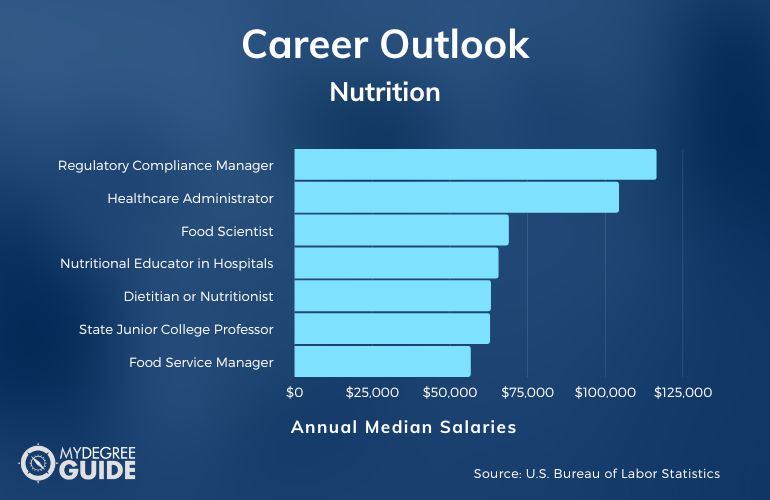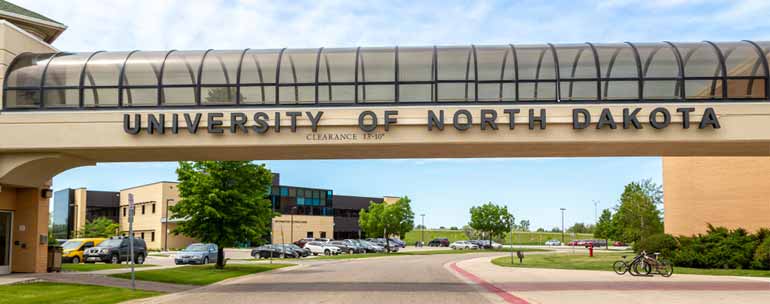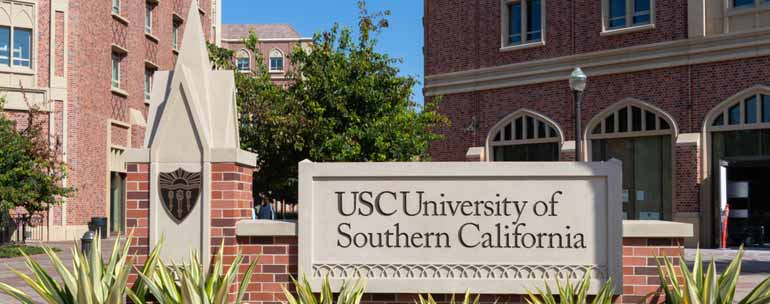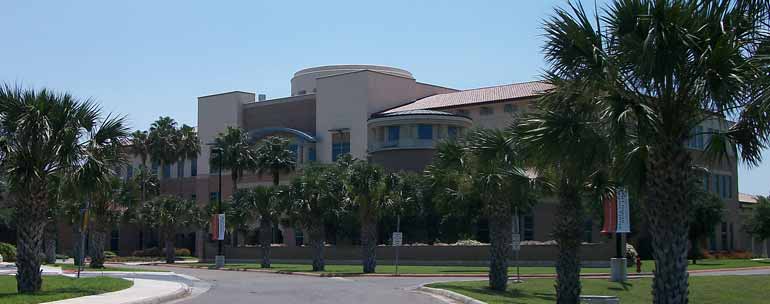With an online master’s in nutrition, you can turn your passion for healthy food into a successful career in a growing field.

Your nutrition expertise can help others eat well, grow strong, and stay healthy.
Editorial Listing ShortCode:
Your studies can prepare you for licensure and a satisfying career in health and wellness.
Online Master’s in Nutrition Degrees

For you, healthy eating may be about more than your personal wellbeing. You may also be driven to help others make dietary choices that will enhance their health. Nutrition masters programs can help you achieve the goal of becoming a professional dietetics expert.
If you are already a dietary professional who studied nutrition during your undergraduate program, this master’s degree may help you advance your career. As you become more knowledgeable, you may become ready to take on more responsibility at work or pursue certification programs.
A nutrition master’s degree may also help you enter this field for the first time. Even if your bachelor’s degree is unrelated to dietetics, a master’s degree can help provide the foundation that you’ll need for a successful career.
For this program, you’ll likely take classes on human physiology, nutrients, metabolism, and public health. Other courses may address nutrition-related issues, such as obesity, dietary deficiencies, and maternal health. You may discuss ways that nutrition, food access, and social justice relate to one another.

At some of the best colleges for nutrition and dietetics, research is a significant focus of the curriculum. In research-focused programs, you’ll learn to interpret others’ studies, conduct your own research, and share your findings. During your program, there may be opportunities to assist with ongoing research.
Some nutrition master’s degree programs include the opportunity to select a degree concentration. Specializations at your school may include clinical nutrition, community nutrition, public policy, and global health and nutrition.
Editorial Listing ShortCode:
With this degree, you could pursue becoming a professional nutritionist or a dietitian. The curriculum and related experiences may prepare you to take the exam for becoming a registered dietitian. Not all programs are accredited for this, though, so consider that before enrolling.
After graduation, you could provide nutrition advice for individual clients, or you might pursue work as a food director in a medical or care facility. You could also be a health educator, a food scientist, an agricultural researcher, or an expert who weighs in on public policy.
Master’s in Nutrition Curriculum & Courses

Guiding others’ health and wellness choices is a significant responsibility, so you’ll need to take many classes about food and the human body for your masters in nutrition science. Some common classes you may take in this program are:
- Dietary Needs for Aging – This course covers nutritional considerations for the elderly, especially those with health conditions.
- Global Population Health – You may discuss global food supplies and talk about ways to improve worldwide public health through dietary initiatives.
- Health Counseling and Education – This course can help equip you to work with individuals or groups to provide dietary guidance and help people make good food choices.
- Health and Nutrition Ethics – In this class, you can learn about healthcare privacy laws and other considerations that should guide your dietetics practice.
- Human Physiology – A class on physiology may cover growth and development throughout the lifecycle with an emphasis on the role of nutrition.
- Maternal and Child Nutrition – This class explores the importance of good nutrition during pregnancy and lactation and the effects of diet on children’s growing bodies.
- Metabolism – Through a study of biochemistry, you can learn about the body’s metabolic systems and the role that food intake plays.
- Nutrition Theory – This foundational course can give you a framework for thinking about healthy eating, nutrient intake, and the consequences of poor nutrition.
- Research on Nutrition Topics – This course teaches how to study others’ nutrition-related research and become a scientific researcher.
- Technology for Dietetics – This course covers digital resources that can help you and your clients formulate reliable nutrition plans.
In addition to coursework, you will probably need to complete a capstone experience before graduation. Often, this is a master’s thesis, but some schools rely on final projects instead. There may also be an internship required for your program.
Nutrition Careers & Salaries

When you tell people that you’re considering a master’s degree in nutritional science, they might assume that you’re planning to become a nutritionist.
While it’s true that this may be one of your top options, you shouldn’t think of it as a career track with a singular focus. Within this realm, there are a wide variety of places you could work and responsibilities you could cover.
Some nutritionists meet one on one with clients to discuss food choices or create customized diet and exercise plans. You could do this in a private office setting, a medical clinic, or a community organization. In a hospital, you might consult with patients who have received diagnoses that require dietary changes.
Other nutrition experts oversee food intake for large groups of people. For example, you might take care of menu supervision in a hospital, a long-term care facility, or a school. You could also be a health educator who teaches classes about food choices.
Editorial Listing ShortCode:
A registered dietitian, also known as a registered dietitian nutritionist, has received special certification. This title may qualify you for jobs that aren’t available to non-certified nutritionists.

Food and nutritional science is another line of work to consider. You could conduct research or encourage government officials to base public policies on scientific findings. Working for a food manufacturer, you might be responsible for studying the health effects of your products, researching consumer tastes, or overseeing legal compliance.
With a master’s, you may be able to teach nutrition at the college level, either on a part-time basis or at a community college.
According to the U.S. Bureau of Labor Statistics, positions for dietitians and nutritionists are currently growing at a rate of 8%.
| Careers | Annual Median Salary |
| Regulatory Compliance Manager | $116,350 |
| Healthcare Administrator | $104,280 |
| Food Scientist | $68,830 |
| Nutritional Educator in Hospitals | $65,530 |
| Dietitian or Nutritionist | $63,090 |
| State Junior College Professor | $62,800 |
| Food Service Manager | $56,590 |
| Health Educator | $56,500 |
| Exercise Physiologist | $49,170 |
| Food Science Technician | $41,970 |
The above figures represent the average salaries of workers around the country, and your wages may be different. Certifications and higher degrees may increase your earnings.
Choosing a Nutrition Degree

Picking a school for your graduate program is a major choice, so it’s smart to consider your options carefully. Each program has its own characteristics and strengths, so you’ll need to evaluate which is the best fit for your goals and learning style.
- Accreditation – Any school you choose should hold regional accreditation. If you plan to become an RD, you’ll also want the curriculum to be accredited by the Accreditation Council for Education in Nutrition and Dietetics (ACEND).
- Cost – Universities usually charge by the credit hour. The cost per credit and the number of hours required will influence your overall tuition price.
- Length of time – Some programs can be completed in just one year, but others may take two years or more. Keep in mind that internship experiences may increase the overall length of any program.
- Online format – Taking online classes can be a flexible way to earn a master’s degree, especially if the program allows you to access course materials and complete assignments whenever it suits your schedule.
- Specializations – Some concentrations, such as community nutrition education or food science, may be available from only a few online colleges.
- RD preparation – Among ACEND-certified schools, there are two different approaches to providing RD preparation. Coordinated programs include both the education and dietetic internship components of qualifying for the RD Exam, but didactic programs require that students go through a separate matching program to secure an internship.
- Requirements – Some colleges require students to complete a master’s thesis, but others have students complete a major research project. There may also be an exam or internship requirements.
Admission to nutrition master’s degree programs, especially those that include the dietetic internship component, can be competitive. To increase your chances of being selected, it’s a good idea to apply to several schools that would satisfy your preferences.
Admissions Requirements

Before you can earn a master’s degree in nutrition online, you’ll need to apply to a college and be accepted. A strong application may help you stand out to admissions committees.
- Essay – Writing a personal statement helps the admissions committee get to know you, your areas of interest, and your goals.
- Letters of reference – You should ask people who have supervised you in academic or professional capacities to attest to your work ethic, capabilities, and determination.
- Test scores: Many graduate schools require that applicants take the Graduate Record Examination (GRE) to prove their readiness for graduate-level studies, but you may be able to request a waiver.
- Transcripts – You’ll need to furnish proof of any college work that you’ve already completed —for your bachelor’s degree and any additional courses. Your transcripts show what grades you earned and whether you’ve taken any prerequisites, such as statistics or biochemistry. Schools may be looking for a minimum baccalaureate GPA.
In addition, you will probably need to fill out an application form that includes your personal contact information and other basic information. A fee may be due along with the application. Some colleges have additional admissions requirements, such as resumes or written interview responses.
Accreditation

Before applying to a school, always make sure that the institution bears regional accreditation. That serves as a sign that the college does an acceptable job of providing a good education.
Without regional accreditation, you can’t be sure that you’re attending a quality school, and you may have a hard time securing financial aid, transferring your credits elsewhere, or getting a good job.
Editorial Listing ShortCode:
According to the Council for Higher Education Accreditation (CHEA), there are six organizations in the U.S. that can give regional accreditation to master’s-granting institutions.
- Higher Learning Commission (HLC)
- Middle States Commission on Higher Education (MSCHE)
- New England Commission of Higher Education (NECHE)
- Northwest Commission on Colleges and Universities (NWCCU)
- Southern Association of Colleges and Schools Commission on Colleges (SACSCOC)
- WASC Senior College and University Commission (WSCUC)
Your graduate school should be recognized by one of these accrediting bodies.
For an online nutrition degree or online dietetics degree, it’s also a good idea to attend a program whose curriculum has been approved by the Academy of Nutrition and Dietetics’ Accreditation Council for Education in Nutrition and Dietetics (ACEND).
Otherwise, you won’t be able to take the exam from the Commission on Dietetic Registration (CDR) for becoming a registered dietitian (RD).
Nutrition & Dietetics Professional Organizations

Nutritionists and dietitians can learn a great deal from one another. To find opportunities to network with others in your field, consider joining one or more professional associations. In addition to cultivating relationships among nutritionists, these groups often provide educational resources.
- Academy of Nutrition and Dietetics – Supporting nutrition professionals since World War I, the Academy represents registered and non-registered nutritionists and technicians, medical nutrition billers, and dietetics educators and students. When you join, you can enjoy print and digital publications, online socialization, career resources, and membership in a local affiliate.
- American Council on Science and Health – ACSH champions the use of sound scientific research in healthcare practice and policies, and they publish articles and carry out advocacy efforts to that effect. This group does not have a membership plan, but supporters can donate to the cause.
- American Nutrition Association – The ANA is committed to the concept that people need personalized nutrition for health and wellness, and they empower professionals to assist with that goal. As a member, you’ll have access to online videos and webinars, print or digital publications, job information, and professional discounts.
- American Society for Nutrition – For nearly 100 years, ASN has promoted nutrition research and dietary decisions that are based on scientific facts. Your membership fee will allow you to read multiple online publications, and you’ll be able to secure discounts and join interest groups.
- American Society for Parenteral and Enteral Nutrition – Whether you are a dietitian or another professional involved in advancing patient care through nutrition, you will probably appreciate the support that ASPEN provides. This group is focused on clinical nutrition and offers membership benefits like networking opportunities, online toolkits, continuing education programs, and event and publication discounts.
- National Association of Nutrition Professionals – NANP explores the relationship between nutrition and whole-person wellbeing. If you are committed to holistic nutrition, you can join this group to contribute toward industry advocacy, network with like-minded professionals, and access training programs.
- School Nutrition Association – SNA supports professionals who ensure that students have access to healthy, affordable meals at school. Whether you join as an individual or a school district, you’ll have access to professional development resources and mentoring opportunities.
Joining one of these organizations during your graduate years may lead to a lifelong membership. As you become established in your career, you may even participate in group leadership or contribute presentations and articles.
Nutrition Licensing and Certification

Although there are jobs in nutrition that you can do without licensure, you’ll have more opportunities available to you if you choose to become a registered dietitian. Certification programs can enhance your career prospects and salary potential as well.
- Certified Clinical Nutritionist – This credentialing program for clinical nutritionists is administered by the Clinical Nutrition Certification Board (CNCB); earning it requires that you take several online courses and pass a three-hour examination.
- Certified Nutrition Specialist – The Board for Certification of Nutrition Specialists (BCNS) runs the CNS certification for professionals who provide personalized nutritional guidance; there are educational requirements, and you must pass the Certification Examinations for Nutrition Specialists.
- Commission on Dietetic Registration Specialty Certification – Through the Commission on Dietetic Registration, a division of the Academy of Nutrition and Dietetics, you can earn board certification in an area like Obesity and Weight Management, Oncology Nutrition, Sports Dietetics, or Pediatric Critical Care Nutrition.
- Registered Dietitian – An RD, also known as a registered dietitian nutritionist (RDN), is a professional who has completed an ACEND-accredited undergraduate or graduate degree program, undertaken an ACEND-approved dietetic internship, earned a passing grade on the RD Examination, and received state licensure.
Earning your master’s degree in nutrition can be a smart educational move because some of these programs are open only to professionals with graduate degrees. Current regulations stipulate that you can become an RD with only a bachelor’s degree, but graduate degrees will be required beginning in 2024.
Financial Aid & Scholarships

Most students depend on financial aid to reduce their college expenses. To fund your education, you may need to use both government and private assistance.
- Fellowships – Some charitable or industry organizations may award you a fellowship to help cover the cost of conferences, school-related travel, or research endeavors.
- Grants – If your financial need warrants it, the federal government or your state government may cover a portion of your tuition costs. This money will not need to be repaid.
- Loans – You may be able to borrow money so that you won’t have to pay all of your tuition costs upfront. Compared to private loans, state and federal loan programs usually have the most affordable interest rates.
- Scholarships – You may receive financial contributions from your school or a private organization. These awards may be one-time gifts or renewable for each year of your program.
- Workplace tuition reimbursement – Your employer may choose to contribute to your school costs if the education that you receive will directly benefit your job performance.
To qualify for federal aid, you must fill out the Free Application for Federal Student Aid (FAFSA). Other assistance programs may request your FAFSA results as well.

What Can I Do With a Masters in Nutrition and Dietetics?
A nutrition masters can help prepare you for a job as a nutritionist. You might work one-on-one with patients or provide dietary guidance for large groups of people. Some nutritionist jobs are only for registered dietitians, but your master’s program might prepare you to earn that credential.
Editorial Listing ShortCode:
Instead of providing nutritional guidance, you could also use this degree for a career in food science, exercise physiology, or health education.
How Much Can You Make With a Masters in Nutrition?
According to the Center on Education and the Workforce, the median masters in nutrition salary is $70,000 per year. The lowest 25% of people with this degree earn less than $51,000 annually, and the highest 25% earn more than $104,000.
Your personal earnings will be influenced by the position, geographic region, and any certifications that you hold.
How Long Is a Masters in Nutrition?

A master’s degree is often considered a two-year program, but the actual timeframe depends on a number of factors. With full-time enrollment in an online nutrition masters degree, you may be able to finish in around 12 to 18 months, especially if your school offers a year-round accelerated course schedule.
Transferring in courses or having a nutrition background may also help reduce the overall length. Part-time study will take longer, of course — perhaps three to five years.
Where Can I Get a Masters in Nutrition?
There are many schools that offer nutrition master’s degrees. You can choose between on-campus study and online classes. If you want to be licensed as a registered dietitian, you’ll need to select a school that is ACEND-certified and then complete an approved internship.
Your studies can be through a coordinated program, in which your college enrollment includes both coursework and the internship, or a didactic program, in which you’ll fulfill the internship requirement separately.
What is the difference Between a Nutritionist and a Dietitian?

In most states, “nutritionist” is a broad term that anyone can use. Because it isn’t regulated, you don’t have to have special training or certification to claim this title. On the other hand, you can’t use “dietitian” unless you are licensed by your state as a registered dietitian.
Editorial Listing ShortCode:
To obtain that licensure, you must take specific courses, work as an intern, and pass the RD Exam.
What Does a Master’s in Nutrition Consist Of?
To earn a master’s degree in nutrition, you will need to take around 30 to 60 credit hours of classes and complete related assignments. Common coursework for this degree covers topics like metabolism, obesity, nutrients, human growth, and health education.
Before wrapping up your studies, you may write a thesis or undertake a major research project. Your school may require practicums or an internship as well.
What Courses Can I Expect in a Master’s in Nutrition Online Program?
Your master’s degree program in nutrition will probably require you to earn between 30 and 60 credit hours. For these, you’ll likely take classes on human development, public health, metabolism, and nutritional deficiencies. Your courses may have names like Lifespan Dietary Needs, Clinical Nutrition, and Dietary Education.
There might also be classes that are specifically focused on research in dietetics, and you may have opportunities to assist with faculty research projects.
Universities Offering Online Nutrition Masters Degree Programs
Methodology: The following school list is in alphabetical order. To be included, a college or university must be regionally accredited and offer degree programs online or in a hybrid format.

American University is a private research university in Washington, D.C. Founded in 1893, American offers bachelor’s, master’s, and doctoral degrees across eight schools and colleges. The school’s annual enrollment of 14,400 students represents learners from more than 40 countries and all 50 states.
- MS in Nutrition Education
American University is accredited by the Middle States Association of Colleges and Secondary Schools.

Auburn University is a public research university in Auburn, Alabama, with an enrollment topping 30,440. U.S. News & World Report has ranked Auburn 44th among public universities in the United States. Dozens of areas of study can be pursued in bachelor’s, master’s, and doctoral programs at Auburn. The school was founded in 1856.
- MS in Nutrition
Auburn University is accredited by the Southern Association of Colleges and Schools.

Bowling Green State University is a public research university in Bowling Green, Ohio, that was founded in 1910. More than 200 academic programs for bachelor’s, master’s, and doctoral degrees are offered across more than eight academic colleges at BGSU.
The school has been ranked 97th on the Top Public Schools ranking by U.S. News & World Report. The school’s annual enrollment number tops 20,000.
- Master’s of Food and Nutrition
Bowling Green State University is accredited by the Higher Learning Commission.

Canisius College is a private Jesuit college in Buffalo, New York, offering 100 undergraduate and 33 master’s programs. The college was founded in 1870.
A large portion of the nearly 3,500 students who enroll annually at Canisius pursue studies related to health and wellness. U.S. News also has ranked Canisius 13th on its Great Schools, Great Prices list for regional universities in the North.
- Master’s in Applied Nutrition
Canisius College is accredited by the Middle States Association Commission on Higher Education.

Central Michigan University is a public research university located in Mount Pleasant, Michigan, that enrolls more than 20,000 students annually. Roughly, 7,000 of CMU’s students are enrolled online. Founded in 1892, CMU offers more than 200 academic programs for bachelor’s, master’s, and doctoral studies.
- MS in Nutrition and Dietetics
CMU is regionally accredited by the Higher Learning Commission.

East Carolina University in Greenville, North Carolina, has an annual enrollment approaching 30,000. Founded in 1907, the university is comprised of nine undergraduate colleges, one graduate school, and four professional schools offering a variety of options for bachelor’s, master’s, and doctoral programs.
ECU offers robust research opportunities and affiliations.
- MS in Nutrition
East Carolina University is accredited by the Commission on Colleges of the Southern Association of Colleges and Schools.

Beginning in 1849, Eastern Michigan University is home to more than 20,000 students pursuing one of its 200 undergraduate and 150 graduate degrees. Offering a blend of academics, volunteer programs, and global networking, students at EMU can receive a high-quality public education that helps prepare them for the future.
- MS in Human Nutrition
Eastern Michigan University is accredited by the Higher Learning Commission.

Kansas State University is a public research university situated in Manhattan, Kansas. In addition to a robust undergraduate program, KSU offers 65 master’s programs and 45 doctoral programs. Founded in 1863, the school enrolls more than 21,000 students annually across its nine colleges.
Kansas State ranks nationally among public universities regarding the total numbers for Rhodes, Marshall, Truman, Goldwater, and Udall scholars.
- MS in Nutrition, Dietetics and Sensory Sciences
Kansas State University is accredited by the Higher Learning Commission.

Logan University is a private university specializing in the health sciences in Chesterfield, Missouri. Logan offers bachelor’s, master’s, and doctoral degrees. Roughly 1,380 students enroll at Logan annually.
The Logan College of Health Sciences offers degrees related to health informatics, nutrition and human performance, and sports science and rehabilitation. Logan was founded in 1935.
- MS in Nutrition and Human Performance
Logan University is accredited by the Higher Learning Commission of the North Central Association of College and Schools.

Founded in 1887, North Carolina State University is a public research university located in Raleigh. NCSU is the largest university in the Carolinas.
The more than 35,00 students who enroll at NCSU annually can choose from 106 bachelor’s options, 104 master’s options, and 61 doctoral options. U.S. News & World Report has ranked North Carolina State University 34th among public universities in the United States.
- Master of Nutrition
North Carolina State University is accredited by the Southern Association of Colleges and Schools Commission on Colleges.

Northeastern University is a private research university in Boston, Massachusetts, that is known for its cooperative education (co-op) program that offers real-life work experience to future graduates.
Founded in 1898, NU now enrolls more than 27,000 students annually across a wide range of bachelor’s, master’s, and doctoral programs. U.S. News & World Report has named NU on its lists for the Most Innovative Schools, Best Clinical Training Programs, and Best Value Schools.
- MS in Applied Nutrition
Northeastern University is regionally accredited by the New England Association of Schools and Colleges, Inc.

Founded in 1890, Oklahoma State University is a public research university offering bachelor’s, master’s, and doctoral programs. OSU has been named a Truman Honor Institution for its success in producing Truman scholars.
The school is also classified by the Carnegie Foundation as a research university with the highest research levels. More than 25,000 students enroll annually at OSU.
- MS in Dietetics
Oklahoma State University is accredited by the Higher Learning Commission.

Founded in 1881, South Dakota State University is South Dakota’s oldest university.
This public research university in Brookings, South Dakota, offers bachelor’s, master’s, and doctoral degrees across 175 fields of study. U.S. News & World Report has ranked South Dakota State University as the 135th best public university in the United States. SDSU enrolls more than 12,500 students annually.
- MS in Dietetics
South Dakota State University is accredited by the Higher Learning Commission.

Stony Brook University in Stony Brook, New York, is one of four university centers within the State University of New York system. Founded in 1957, Stony Brook offers bachelor’s, master’s, and doctoral programs.
The school is renowned for producing research related to scientific studies. U.S. News & World Report has ranked Stony Brook University 91st among national universities.
- MS in Nutrition
Stony Brook University is accredited by the Middle States Commission on Higher Education.

Texas Tech University is a public research university in Lubbock, Texas, that was founded in 1923. TTU offers more than 150 courses of study for bachelor’s, master’s, and doctoral students spread across 13 colleges. Students from all 50 states and more than 100 countries represent the school’s annual enrollment of nearly 38,000.
The Wall Street Journal has placed Texas Tech University in 18th place in its ranking of graduate desirability for job recruiters.
- MS in Nutrition and Dietetics
Texas Tech University is accredited with the Southern Association of Colleges and Schools Commission on Colleges.

Texas Woman’s University is the country’s largest state-supported university primarily for women. However, the school has technically been a co-educational university since 1994.
TWU is a public university located in Denton, Texas, that is known for offering strong programs in the health sciences. It offers bachelor’s, master’s, and doctoral studies for 60 areas of study across six colleges. TWU was founded in 1901.
- MS in Nutrition
TWU is accredited by the Southern Association of Colleges and Schools Commission on Colleges.

The University of Alabama is a public research university located in Tuscaloosa, Alabama, with a history dating back to 1820. UA is the University of Alabama System’s flagship school.
The more than 38,500 students enrolled at UA annually can pursue bachelor’s, master’s, and doctoral degrees offered through more than 13 academic divisions. U.S. News & World Report ranks the University of Alabama as the 72nd best public university in the United States.
- MS in Human Nutrition
The University of Alabama is accredited by the Southern Association of Colleges and Schools Commission on Colleges.

The University of Bridgeport is a private university in Bridgeport, Connecticut, with an annual enrollment nearing 5,500. UB offers bachelor’s, master’s, and doctoral studies to a student population consisting of learners from 80 countries and 46 states.
Founded in 1927, University of Bridgeport maintains a campus featuring Victorian homes built by historic business owners like P. T. Barnum.
- MS in Nutrition
The University of Bridgeport is accredited by the New England Association of Schools and Colleges.

The University of Central Missouri in Warrensburg, Missouri, offers more than 150 programs of study for students seeking bachelor’s, master’s, and doctoral degrees. The school was founded in 1871. It now enrolls more than 14,000 students representing 49 states and 59 countries annually.
- MS in Nutrition – Clinical Nutrition
The University of Central Missouri is accredited by the Higher Learning Commission.

Founded in 1785, the University of Georgia is a highly respected research university in Athens, Georgia, with an annual enrollment above 38,000. UGA is one of the nation’s oldest public universities. U.S. News & World Report ranks UGA as one of the Top Public National Universities in America.
Students at UGA can pursue bachelor’s, master’s, and doctoral degrees through 17 schools and colleges with heavy research activity.
- MS in Foods and Nutrition – Community Nutrition
The University of Georgia is regionally accredited by the Southern Association of Colleges and Schools Commission on Colleges.

The University of Illinois at Urbana–Champaign is a public research university perched in the twin cities of Champaign and Urbana. Founded in 1867, U of I is the flagship institution of the University of Illinois system.
University of Illinois students can pursue a variety of bachelor’s, master’s, and doctoral degrees offered through 16 schools and colleges. U.S. News & World Report has named U of I 14th among public universities on its list of America’s Best Colleges.
- MS in Food Science and Human Nutrition
The University of Illinois at Urbana-Champaign is accredited by the Higher Learning Commission.

The University of Kansas in Lawrence, Kansas, offers bachelor’s, master’s, and doctoral programs throughout its five campuses and online platform. More than 345 degree programs are offered in total to KU’s student population of more than 28,400.
KU is classified among the R-1: Doctoral Universities for the highest level of research activity possible by the Carnegie Classification of Institutions of Higher Education.
- MS in Dietetics and Nutrition
The University of Kansas is accredited by the Higher Learning Commission.

The flagship campus of the University of Massachusetts system, the University of Massachusetts Amherst offers academic degrees through 109 bachelor’s programs, 77 master’s programs, and 48 doctoral programs across nine colleges.
UMass Amherst was founded in 1863. U.S. News and World Report has ranked the school 24th among public universities on its list of the Best National Universities.
- MPH in Nutrition
The University of Massachusetts Amherst is accredited by the New England Commission of Higher Education.

The University of Memphis is a public research university in Memphis, Tennessee, offering bachelor’s, master’s, and doctoral programs across nearly two dozen programs.
The school is also home to a number of research centers focused on everything from earthquake activity to public health. UofM was founded in 1912. It enrolls more than 22,000 students annually today.
- MS in Nutrition – Environmental Nutrition
The University of Memphis is accredited by the Commission on Colleges of the Southern Association of Colleges and Schools.

The University of Nebraska–Lincoln in Lincoln, Nebraska, is a public research university offering nearly 200 paths of study for bachelor’s, master’s, and doctoral students. UNL is famously the alma mater of Warren Buffet. Founded in 1869, the school enrolls more than 25,0000 students annually.
- MS in Nutrition
- MS in Nutrition and Health Sciences
The University of Nebraska-Lincoln is accredited by the Higher Learning Commission.

The University of North Dakota is a public research university in Grand Forks, North Dakota, that was established in 1883. UND is the oldest university in North Dakota. Students studying at UND today can pursue degrees in more than 224 fields of study.
Academics at UND are divided between 90 undergraduate programs, 54 master’s programs, and 27 doctoral programs. More than 13,500 students enroll at UND annually.
- MS in Nutrition
The University of North Dakota is accredited by the Higher Learning Commission.

Located in Los Angeles, the University of Southern California offers bachelor’s, master’s, and doctoral degrees in hundreds of concentrations. U.S. News & World Report has ranked USC 22nd among all national universities. The school is ranked 55th in the world by the Academic Ranking of World Universities. USC was founded in 1880.
- MS in Nutrition, Healthspan, and Longevity
The University of Southern California is accredited by the Western Association of Schools and Colleges.

The University of Southern Mississippi is a public research university that awards bachelor’s, master’s, and doctoral degrees in subjects across the arts and sciences. This school in Hattiesburg, Mississippi, was founded in 1910.
It is listed among the R1: Doctoral Universities for very high research activity today. Annual enrollment at Southern Miss tops 14,000.
- MS in Nutrition and Food Systems
The University of Southern Mississippi is accredited by the Southern Association of Colleges and Schools Commission on Colleges.

A member of the University of Texas System, the University of Texas Rio Grande Valley enrolls more than 29,600 students annually. UTRGV students study using multiple campuses and online options.
A total of 64 bachelor’s, 49 master’s, and four doctoral programs are offered across 11 colleges and schools at UTRGV. The University of Texas Rio Grande Valley was established in 2013.
- MS in Health Sciences – Nutrition
UTRGV is accredited by the Southern Association of Colleges and Schools Commission on Colleges.

The University of Utah is recognized by the Carnegie Classification of Institutions in Higher Education as a top-tier public research university located in Salt Lake City, Utah. Founded in 1850, the school offers more than 150 bachelor’s, master’s, and doctoral programs across 17 colleges and schools. U of U is the home of Utah’s first medical school. Annual enrollment tops 32,800.
- MS in Nutrition and Integrative Physiology
The University of Utah is accredited by the Northwest Commission on Colleges and Universities.
Getting Your Nutrition Masters Degree Online

Good food and balanced diets can help people live strong, healthy lives. If you desire to show individuals and communities the benefits of good nutrition, then a master’s degree in dietetics and nutrition may be for you.
Graduate studies in this area can help prepare you to start your career in this field, advance to positions of greater responsibility, or pursue licensure as a registered dietitian.
Online nutrition master’s programs will allow you to earn this degree in a way that fits your busy lifestyle. You can begin the process of nutrition graduate studies by submitting applications to your top schools.

